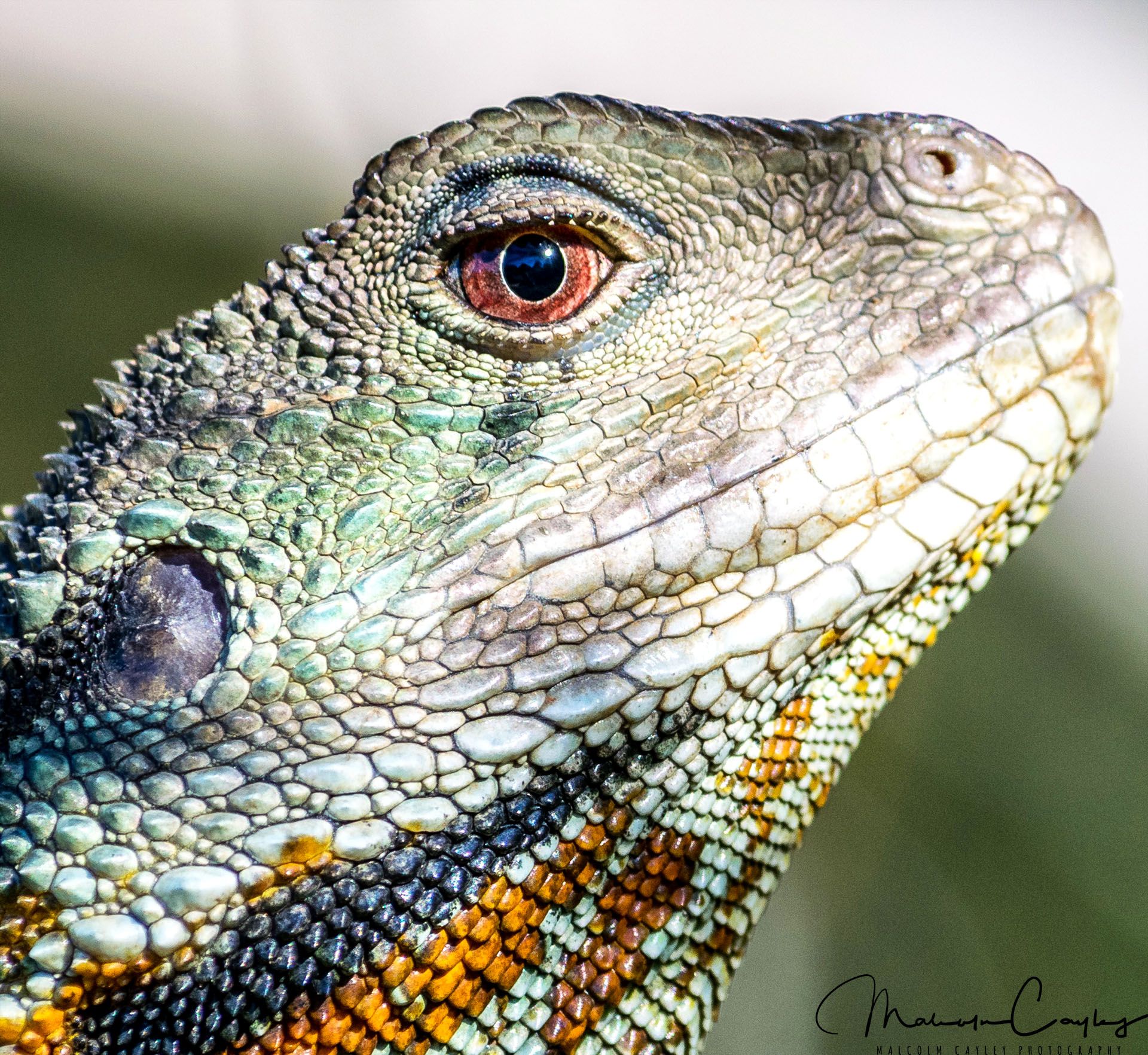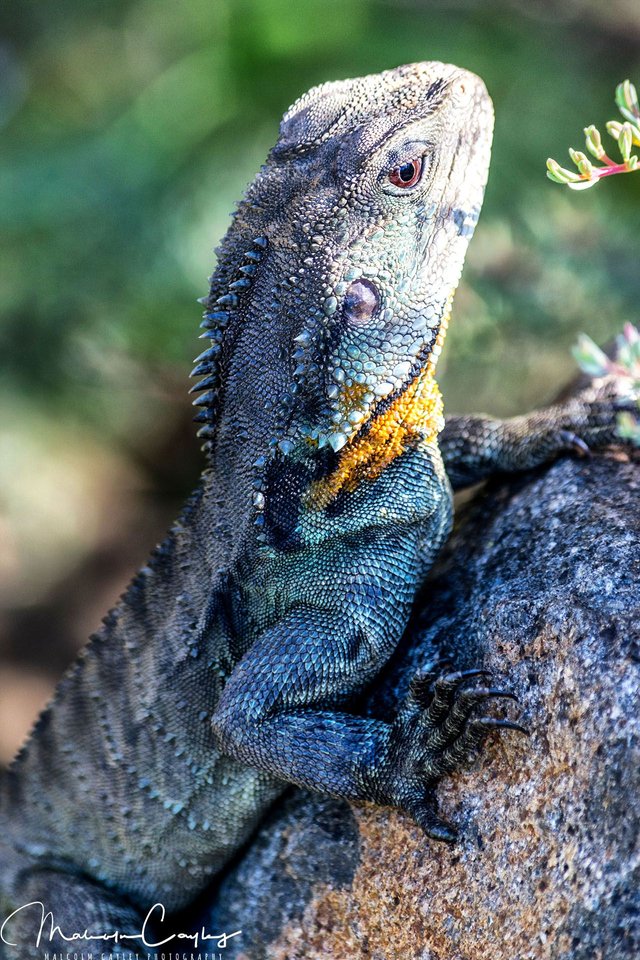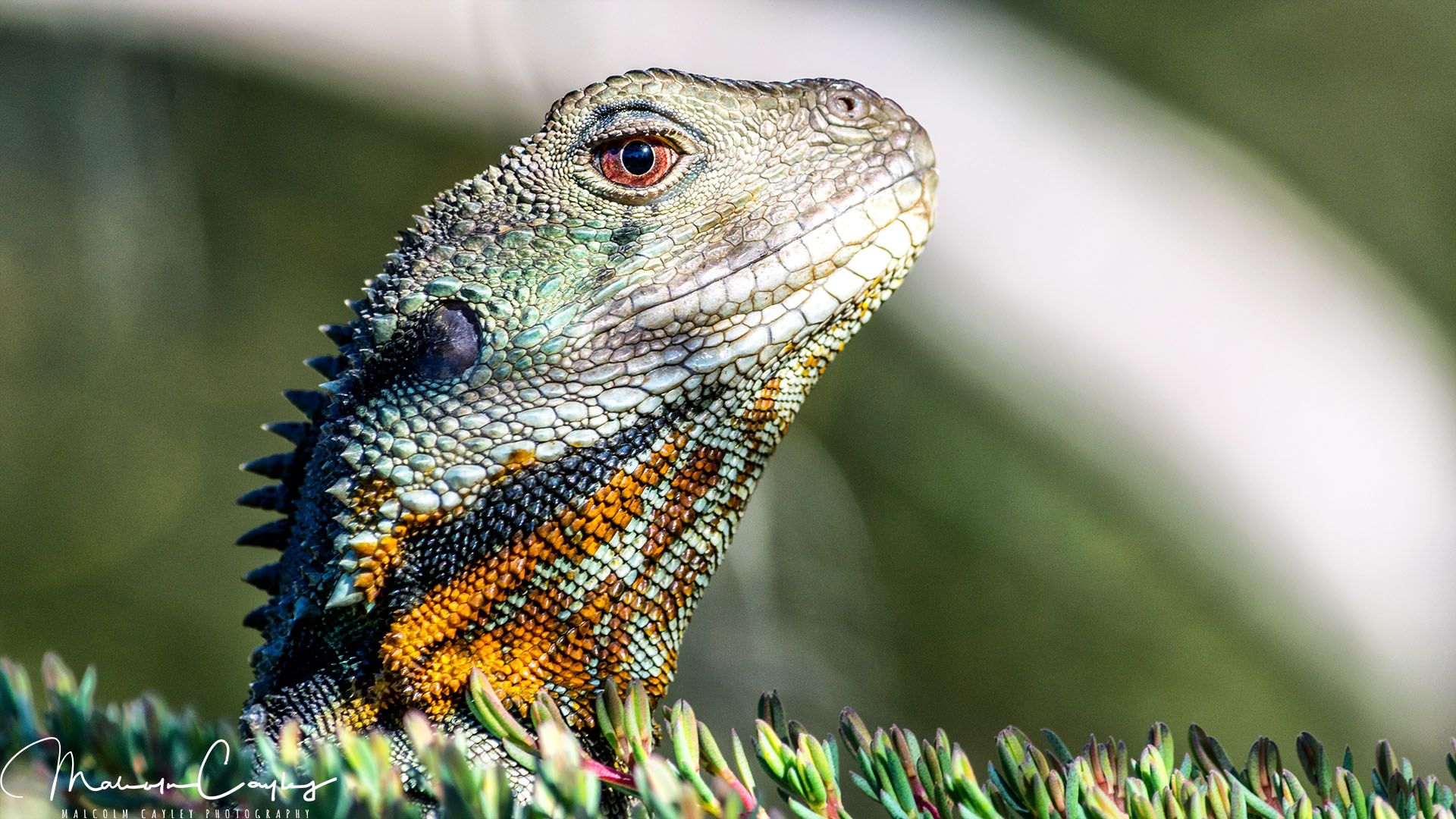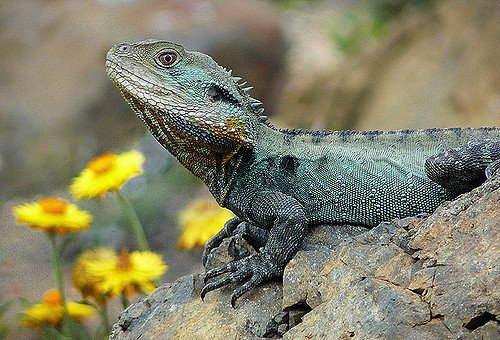Dear Steemians!

A few months ago we were lucky to stumble upon this guy wandering around the National Botanical Gardens here in Canberra, Australia. He was hanging out sunning himself like all lizards do when the weather gets a little chilly. He's a decent size for a lizard, in fact I don't think I've ever been as lucky to be in a position to photograph such a magnificent lizard (Water Dragon).


At home I managed to correctly identify the Water Dragon by the unique markings along its belly.
Thanks for reading :)
Wow that's awesome keep it up
Downvoting a post can decrease pending rewards and make it less visible. Common reasons:
Submit
Cheers :)
Downvoting a post can decrease pending rewards and make it less visible. Common reasons:
Submit
Terrific photos. I used to see lots of Eastern Waterd Dragons along the Peel River up around Tamworth. Wish I had a camera at the time.
Downvoting a post can decrease pending rewards and make it less visible. Common reasons:
Submit
Thanks! I know they always appear in masses when you don't have a camera. Sometimes I'll go for a hike and see many things that vanish as soon as I get my camera. Luck and chance plays a factor I think :) I haven't seen him since either.
Downvoting a post can decrease pending rewards and make it less visible. Common reasons:
Submit
Really nice close-ups. I'm surprised it was so easy to identify him from a couple of photos. Did you enhance the colours, or are they as you shot them? If so that is one truly stunning animal. Look forward to seeing more.
Downvoting a post can decrease pending rewards and make it less visible. Common reasons:
Submit
Thank you! Yes, I used the photos I had to identify him with wiki. The colours on the belly are quite unique to this breed which was a huge help during the identification process. For instance, this image:

also identifies as the same type. I wouldn't say it was easy because it took me a while (and I'm a researcher at the moment) to find a decent listing of breeds. The colouration has been adjusted to what I remember seeing IRL. The camera only captures some of the moment, you have to work the image to get it to become your experience of the moment. The above image appears a bit dull from what I remember it.
Downvoting a post can decrease pending rewards and make it less visible. Common reasons:
Submit
It sounds like it was a lot of work. But very interesting to see how you went about it. You must have been sifting through a lot of similar lizard photos for a while.
I do have to disagree slightly with your comment about the image requiring work to become your experience of the moment though, as I follow the Henri Cartier Bresson school of thought, who believed an image was a snapshot of a moment created in the camera and if it required work it wasn't worthy. While I understand that isn't always a feasible solution, I would not be able to agree, that an image requires editing on principle.
I'm definitely looking forward to seeing more of you shots. It's great to see other photographers work and how they go about it.
Downvoting a post can decrease pending rewards and make it less visible. Common reasons:
Submit
Well all in a day's work - luckily there are pages that provide lists for these sorts of thing and there was only one lizard (water dragon) that resembled the one I saw.
Very interesting philosophy about the creation of an image. Of course, I think this is more applicable for film photography rather than digital. For instance, what is the "true" photo? If I shoot in JPEG I ask the camera to make decisions regarding the image and than discard the data for me; if I shoot RAW I have all that data but the colour space for web is different than for print so I must adjust the photo data to conform with the use of the image. The moment itself becomes more and more complex with the addition of more technology. However, if I were to shoot on film I have decisions to make in the darkroom during development of the negative and then again during the printing of the photo when using the enlarger. These decisions are for me part of the moment that intertwines with the memory of the act of taking the photo. I love a good adjustment afterwards. Plus street and candid photography isn't really my thing so I can see why I probably disagree with the approach because I like a bit more control.
Here's the original but the difference isn't stark(right click view image to see it in full resolution):
Nevertheless this is a great line of discussion that I will have to make a post about: the philosophy of the image. I'll have to do some research on the different views :) Thanks for your post :) Followed :)
Downvoting a post can decrease pending rewards and make it less visible. Common reasons:
Submit
I do shoot mainly on film so there is that. However, I don't do any darkroom work. I find people I can trust with my images and hand them with minimal instruction, as to how I want them processed. To me, that's just a "truer" way of taking pictures. Plus I hate mucking about in post-processing. At most I'll run a scan of a negtive through Lightroom on occasion to iron out any imbalances that can occur during the scanning.
I do agree though, that with digital there is no real "negative". One could say RAW is similar to an unprocessed positive emulsion (like slide film) and during post-processing you receive your final image. However, with film you wouldn't sit there editing each colour channel individually and use a specific approach for the entire roll.
It is true though, that you cannot really take a picture digitally and expect the result to look the same on your phone, desktop and camera screen. This is a problem I frequently encounter with my Fuji XT-10, where the images end up looking a lot more saturated than they should be once they get transferred to my desktop.
As regards the picture, the difference may not be too noticeable, but I prefer it over the edited images in your post. I prefer the more muted tones, which to me make the marking look more natural, as opposed to the images in your post, which seem slightly artificial to me.
I do hope you make a post about the philosophy of the image. Personally, I have been focusing on the differences between digital and analogue and would love to share my input on that post should you have any need of it.
Downvoting a post can decrease pending rewards and make it less visible. Common reasons:
Submit
That explains it ;) Don't get me wrong, I love my medium format film gear (35mm too although it doesn't see as much use these days because I have a 135 back for my Bronica) but film adds extra work and expense perhaps needlessly. Film definitely slows you down and lets you focus on your technique which improves your image (I owe much to film for improving my digital work) but sometimes I feel that if I shoot more than a single roll I'm rushing myself.
The local film shop is a bit apprehensive about discussing the technical aspects of their work and just really prefer to get on with the job and if you don't like the results "we don't really want to hear about it" type of attitude. However this might be because I really like the technical aspects of colour theory and imagining technology which they feel is unrelated to their daily job of processing. While this is probably not the case everywhere it has been my experience.
Digital allows me to take full control over my image making it more mine than anything. The "truth" to any image is of course up for debate; but Adobe Lightroom does allow you to edit your entire shoot in a single go in a similar way to how you would process an entire roll. The changes in saturation are caused by the different colour spaces between display devices. I've calibrated my laptop to sRGB but others might be set differently. I'm lenient with this fact of life because I'm satisfied with the image before its release.
I love colour and bright light and lately my post workflow has been taking me to push the upper limits of the image. Most photographers prefer the opposite and film gives you a far more desaturated / low contrast / halation look anyway so I can acknowledge your point. Human eyesight is biased towards darken tones (probably from an urge to see in dark areas like caves) so difference is increased and darker tones are easier to distinguish. However, most amateur photographic work loves to blur skin, increase brightness, over expose etc. which I guess was my direct competition in days gone by when I would post my work on Facebook. I should join the more "professional" crowd now and adopt a toned down approach :)
Considering our differing points of view, we should have a debate between posts regarding this topic. I'll post mine up soon and we can continue the discussion while earning SBD for our respective posts :D
Downvoting a post can decrease pending rewards and make it less visible. Common reasons:
Submit
That's a really good idea. We could do a kind of your point of view/my point of view post whilst linking each others content. Would have to coordinate a bit though. I can absolutely understand what you are saying about wanting control and digital giving you that ability. Lightroom is a fantastic tool, but I only really ever used it when I was using a slide copier to digitalise my negatives. A painful process, even with the ability to apply my setting to an entire set of images and I quickly decided to pay the premium for high quality scans, if I needed them. If I were in your situation I would probably take a similar approach, can't imagine what benefit a lab would have out of being so utterly difficult about things. I've always been fortunate enough to have good labs around me and cannot really stomach sitting in front of Lightroom that much. In fact, I recently got rid of my entire Adobe CC installation because it was sitting idle. I really like your theory about the human eye being tuned to darker tones for evolutionary reasons. Must put some research into that. Overall I have to say this has been a most enlightening discussion and has given me quite a lot of food for thought. Let me know when you will be putting up your post. Look forward to more stimulating discussions in the future.
BTW which Bronica do you shoot? I have the ETRsi and absolutely love that thing, although it's quite a cumbersome beast. There are few things that come out as nicely as Portra 160 on medium format in my opinion. The detail is simply stunning.
Downvoting a post can decrease pending rewards and make it less visible. Common reasons:
Submit
I was thinking of writing something and you could either write a reply underneath or better yet for exposure write a completely new post as a response and tag mine so more people can follow along. It would be a conversation of sorts except we're being paid - kind of like what academics do when they publish papers and responses to other papers. I'm working on my thesis atm so it will have to be when I have more time but expect it soon :)
I've found film forces me to allows others to take charge of aspects of my creative process because I don't have the equipment to do it myself. Maybe my opinion would be different if I had the equipment but god damn scanning negatives is definitely not my thing; not to mention the need to colour correct always afterwards. Jealous that you have good labs around you but my experience was more business-like and condescending to say the least.
I've read that theory somewhere online but I can't remember where. I'm sure there are other theories regarding our ability to distinguish between darker tones rather than brighter ones. It was mentioned in an advanced colour theory course I took last year as well.
I've got a ETRS with a 150mm and a 75mm lens with various backs including the very rare 135 pano which gives a 70mm width negative (x2 of normal 135 exposure).
Downvoting a post can decrease pending rewards and make it less visible. Common reasons:
Submit